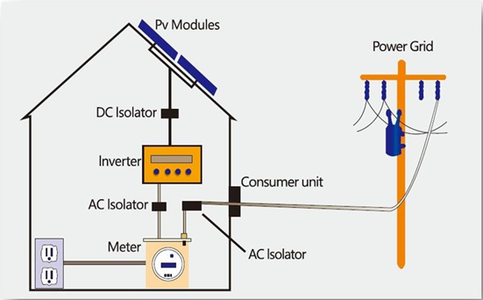Solar Power systems can be categorized into two types – Off-grid solar system and on-grid/grid-tie solar system. But, why is the grid there in the first place? Also, which one should you choose between the two? Read on to learn the major differences between the on-grid installation and off-grid installation.
Definitions
On-grid systems are those solar power systems that produce energy only when the utility power grid is there. In order to work, these systems need a connection to the grid. In case you overproduce power, the on-grid solar systems send the additional power back to the grid, which helps you save it for later use. On-grid systems are also dubbed grid-tie or integrated systems.

On the other hand, off-grid solar power systems are those that help you store the solar energy in batteries in case the power grid fails or the grid is not available. To balance the grid power during sunlight, power is provided by hybrid systems. These systems also send excessive power to the grid so you could use it later.
Requirements
On-grid solar systems generally need solar panels along with a proper mounting system; solar cables and MC4 connectors;grid tied solar inverter and monitor;AC and DC safety isolator switches; and grounding earth cables and clamps.
Off-grid solar systems usually require solar panels with an appropriate solar mounting system; off grid solar inverter;solar cables and MC4 connectors; solar power controller and batteries; AC and DC safety isolator switches; and grounding earth cables and clamps.
Advantages and Disadvantages
On-grid solar power systems offer several advantages such as:
- Utility is a 100% efficient battery, which has the potential to absorb all the additional energy.
- You need not to bring any change in your lifestyle or conserve electricity.
- It provides you a backup of a stand-alone unit.
Disadvantages of on-grid systems:
- These provide less incentive to conserve
- These are battery-less systems, which provide you no backup.
Advantages of off-grid systems:
- These are less expensive, even when compared to availing a utility line stretched to a property. However, there will be ongoing expenses.
- These systems are good in terms of expandability.
- These systems help you make efficient use of electricity, which benefits the environment.
Disadvantages of off-grid systems:
- These require regular maintenance and troubleshooting.
- Batteries of off-grid systems have less tangible cost, which means energy waste.
Which of the two systems is better?
The dealer will most probably help you choose the best between the two types of solar power systems. If you fail to connect to the local mains electricity supply, the off-grid solar system is the only choice you have.
In all other cases, an on-grid solar system is suggested, which is great on grounds of both, reliability and cost-efficiency. These systems do not demand for batteries, which cost a lot and ask for replacement from time to time. Also, you need fewer panels in case of on-grid solar power systems due to no need for producing extra power when there is no sunlight. It helps cut cost as well as the payback time.
The choice lies with you.
